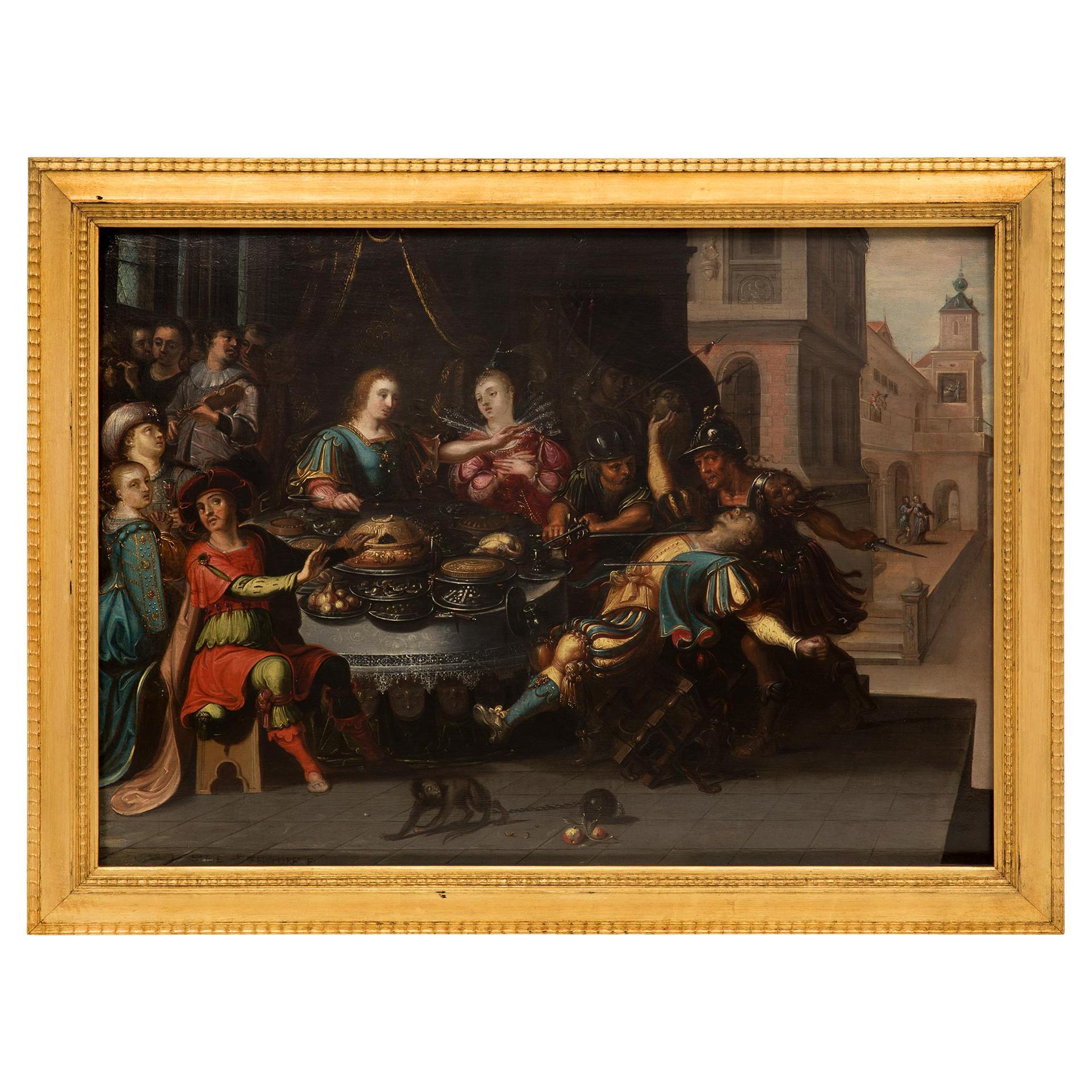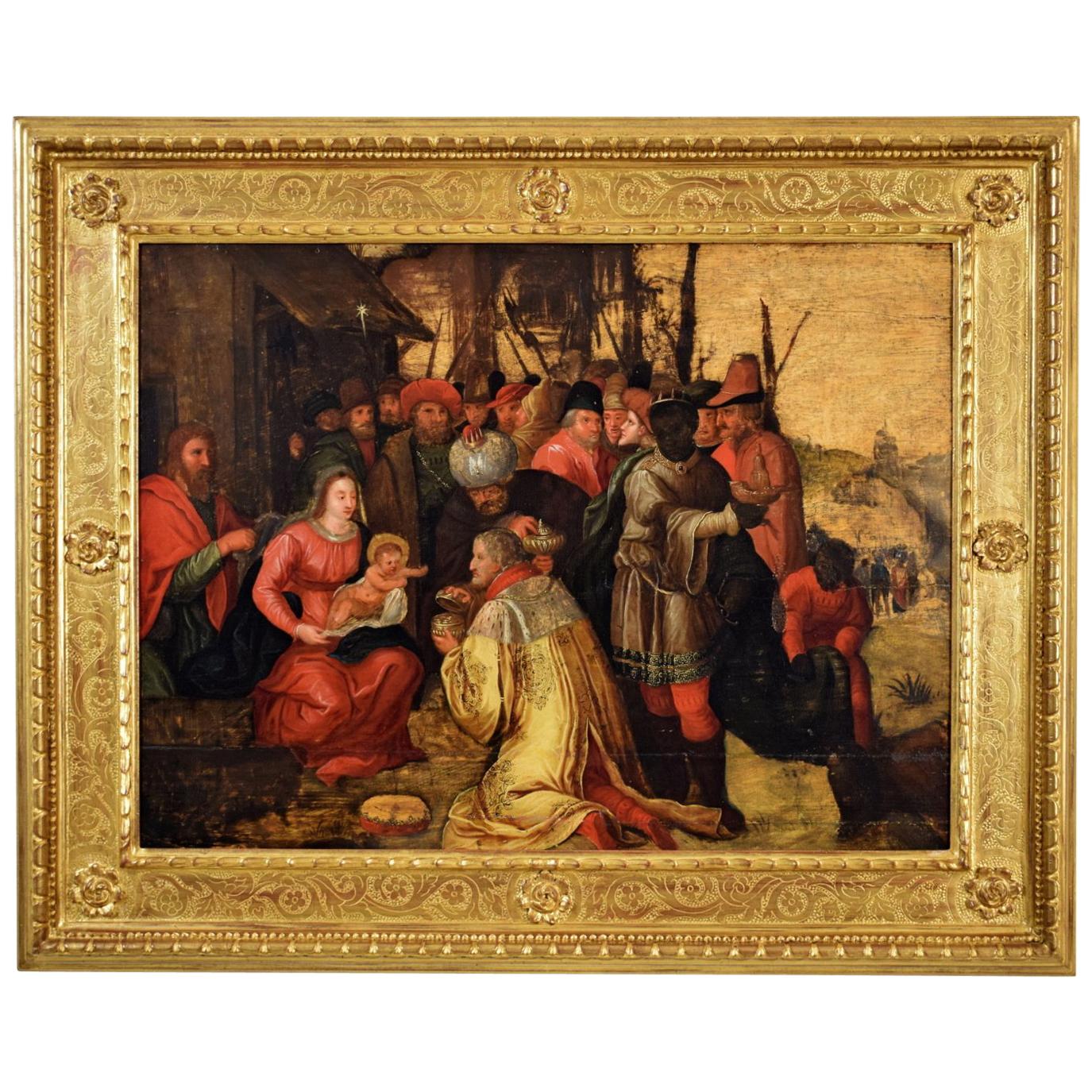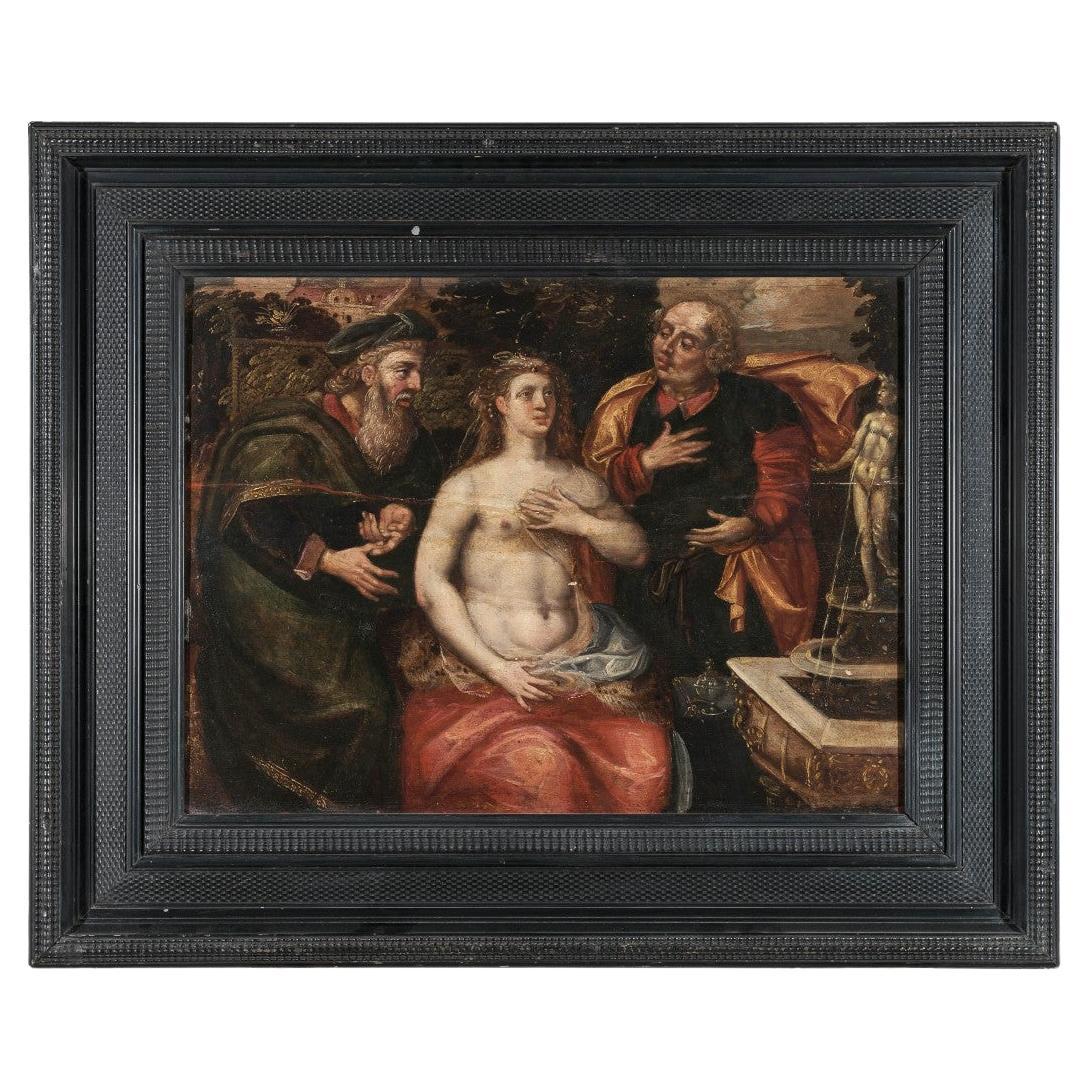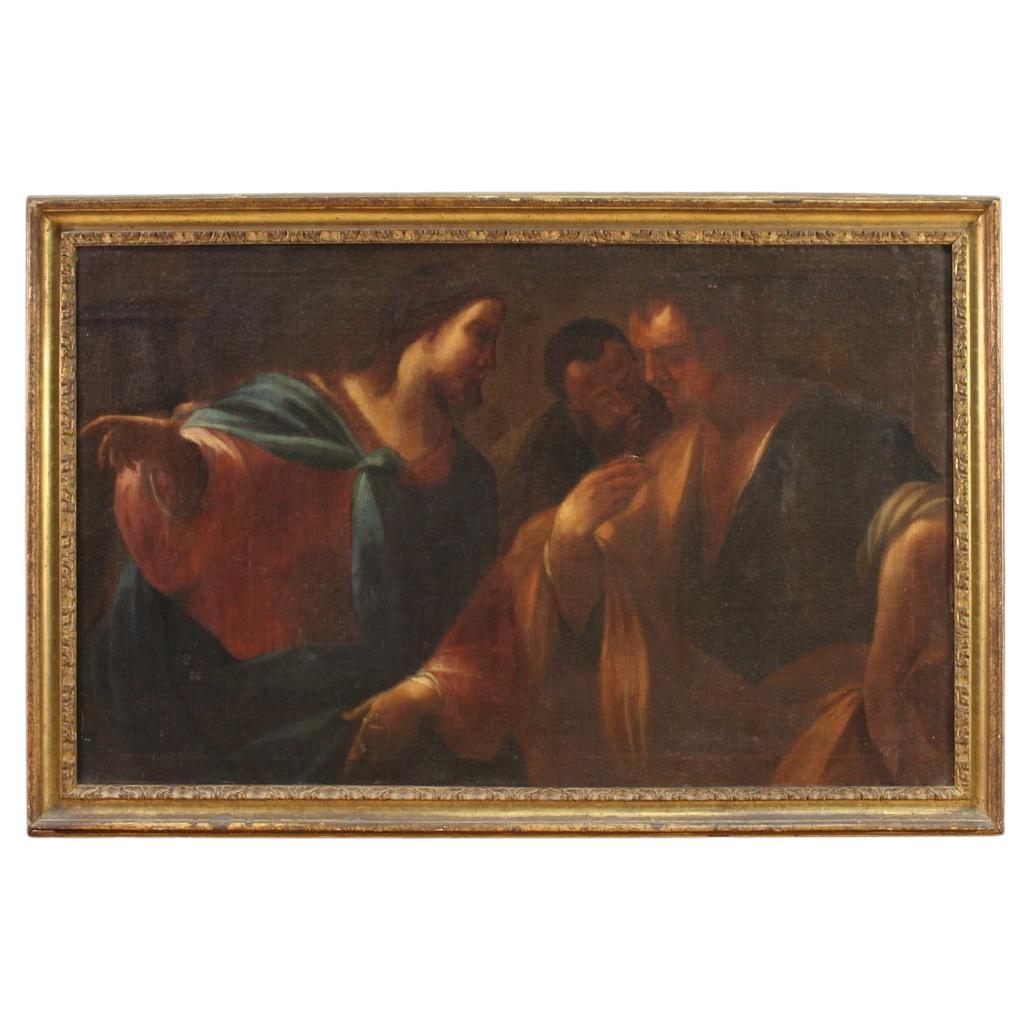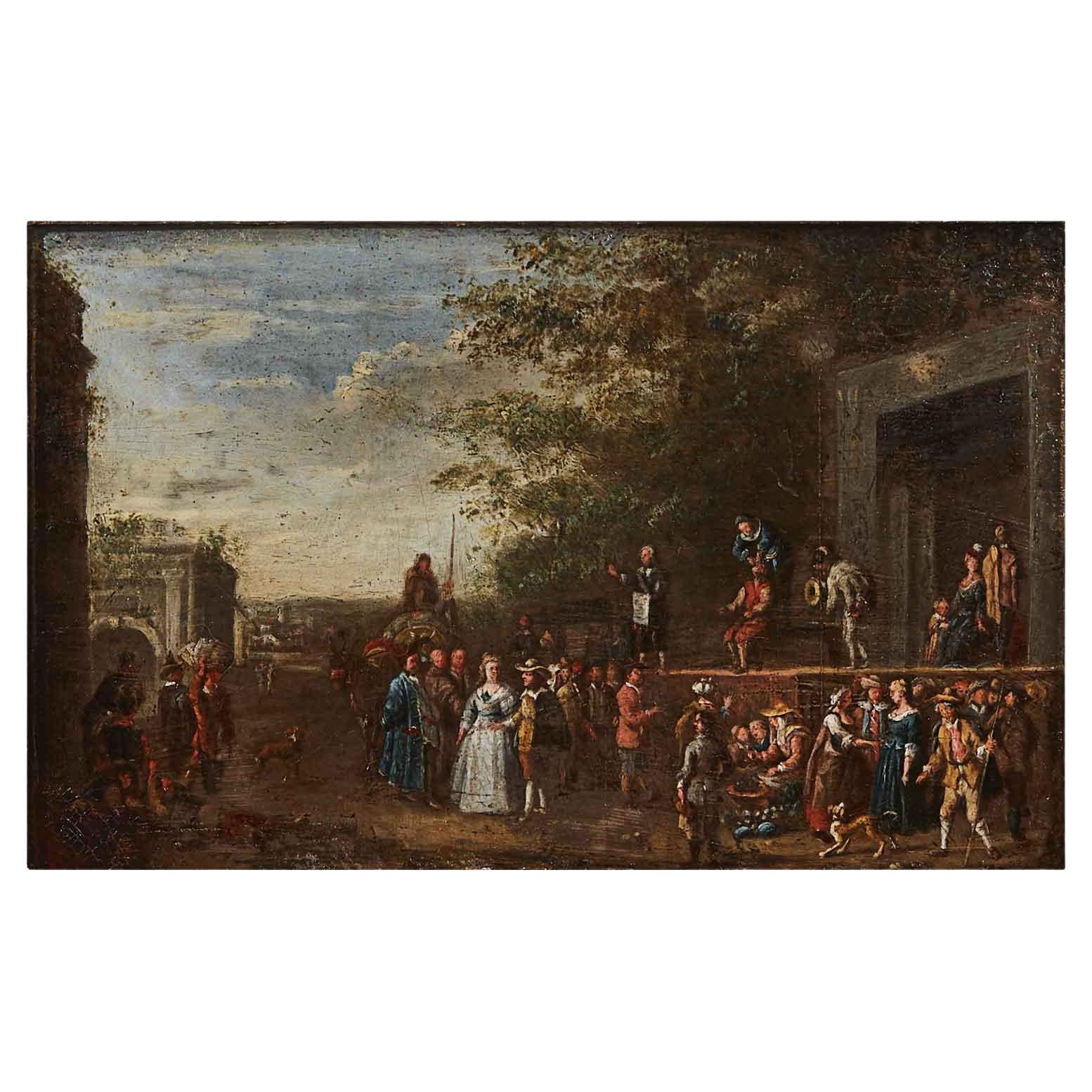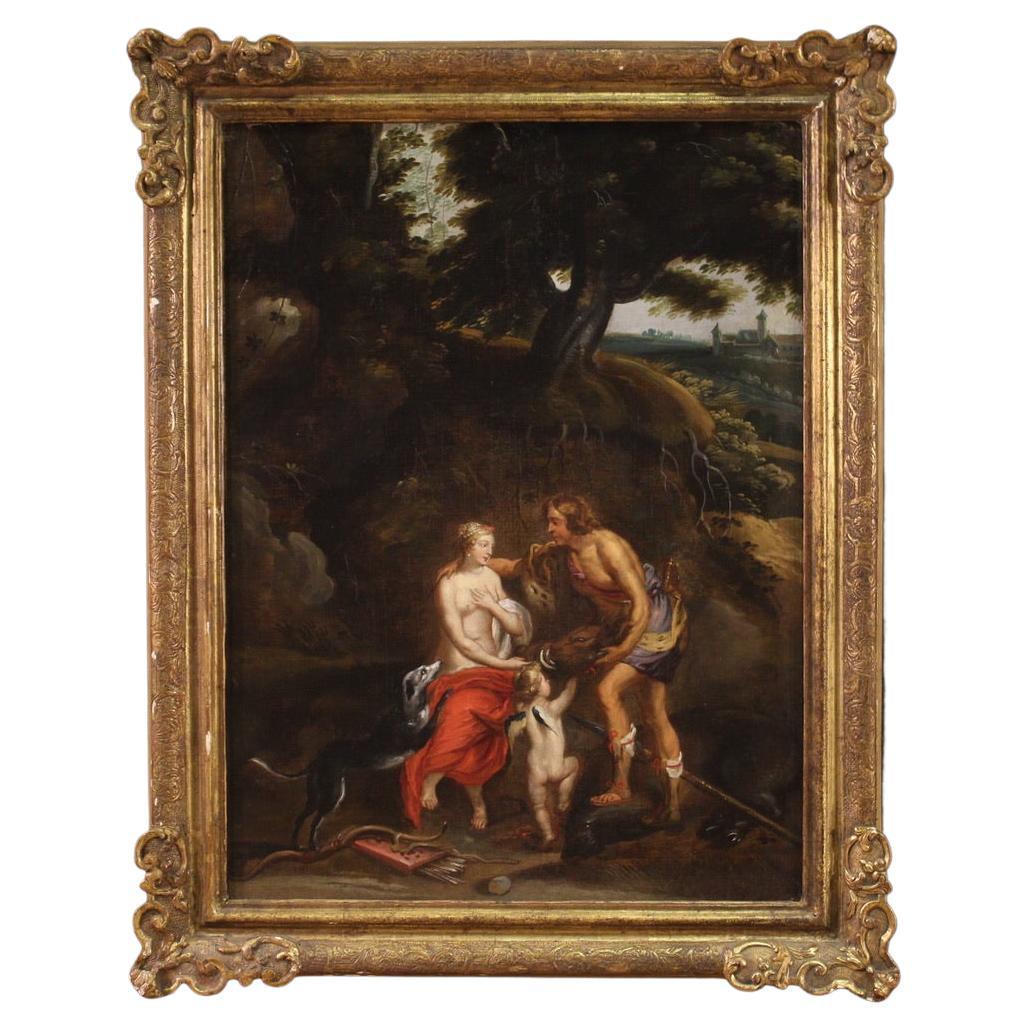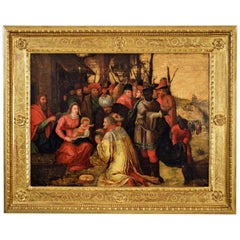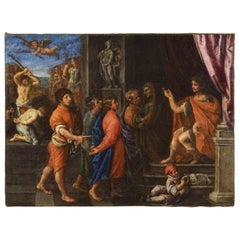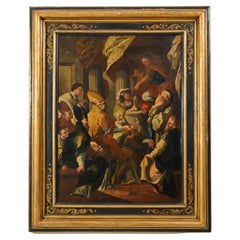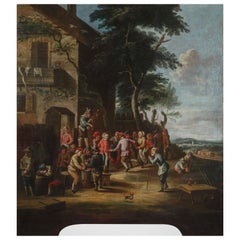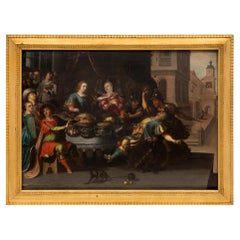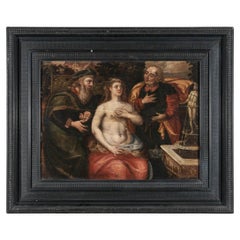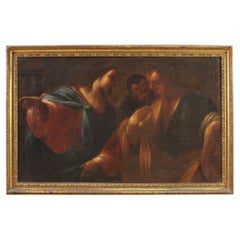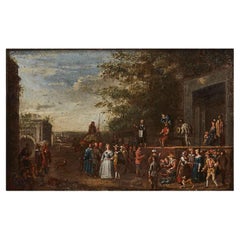Items Similar to 17th Century Flemish Oil on Panel Monogrammist H.C., Soldiers Gambling for Tunic
Want more images or videos?
Request additional images or videos from the seller
1 of 13
17th Century Flemish Oil on Panel Monogrammist H.C., Soldiers Gambling for Tunic
$14,881.02
£11,060.65
€12,500
CA$20,546.60
A$22,784.66
CHF 11,971.65
MX$278,389.81
NOK 149,781.65
SEK 140,595.67
DKK 95,181.25
About the Item
17th century Flemish oil on panel Monogrammist H. C.
"Soldiers gambling for Christ's tunic"
The fine painting depicts the biblical scene in which the four soldiers, in charge of guarding the Gòlgota, at the foot of the cross on which Jesus is crucified, gambling for Christ's tunic. The episode is detailed in the Gospel according to John (19:23-24). The soldiers, when they had crucified Jesus, took his garments, and made four parts, one for each soldier. The Christ’s tunic was instead seamless, woven entirely of a piece. So they said to each other: ‘Let’s not tear it, but cast lots for it, to see who gets it’”
The work was attributed by art historian Fred Meijer, an expert in Flemish and Dutch art of the 17th century, to the Flemish painter known under the name “Monogrammista H.C.”. This artist was active in the South Netherlands in the 17th century and is known for his genre scenes: village inns with farmers playing and drinking, fortune tellers, cheerful companies, domestic interiors. The monogram 'HC' (or 'HG') was identified as the signature of Antwerp artist Willem van Herp. The German biographical dictionary of Thieme-Becker artists brought together a number of works traditionally attributed to van Herp, which were returned to this artist with the name 'Pseudo Herp'. More recently, Fred Meijer was able to identify, through the discovery of some works signed with the monogram H.C., a corpus of paintings that could be returned to this artist. These include works previously attributed to van Herp, Pieter Codde, Adriaen Rombouts and David Ryckaert III. The Monogrammist H.C. active in Antwerp must be distinguished from an artist, also referred to as Monogrammist H.C., who however was active in the North Netherlands as a landscape painter.
From the stylistic comparison with the works now recognized to the Monogrammist H.C. are highlighted strong closeness in the typology of brushstrokes and in the way to treat the figures and faces, drapes, backgrounds; just as comparable is the chromatic palette used, played in shades of brown and red from which usually stands out a detail of a dress, treated with a blue dust.
The table is in good condition. On the painting there is a thick layer of yellowed paint that prevents the color contrast of the original colors. There is a cleaning operation useful for the removal of paint and the recovery of the full chromatic reading of the work. As a result of this intervention, new images will be published.
Object with "Certificate of Authenticity".
- Dimensions:Height: 28.75 in (73 cm)Width: 21.66 in (55 cm)Depth: 1.97 in (5 cm)
- Style:Baroque (Of the Period)
- Materials and Techniques:
- Place of Origin:
- Period:
- Date of Manufacture:17th Century
- Condition:
- Seller Location:IT
- Reference Number:1stDibs: LU4405217741741
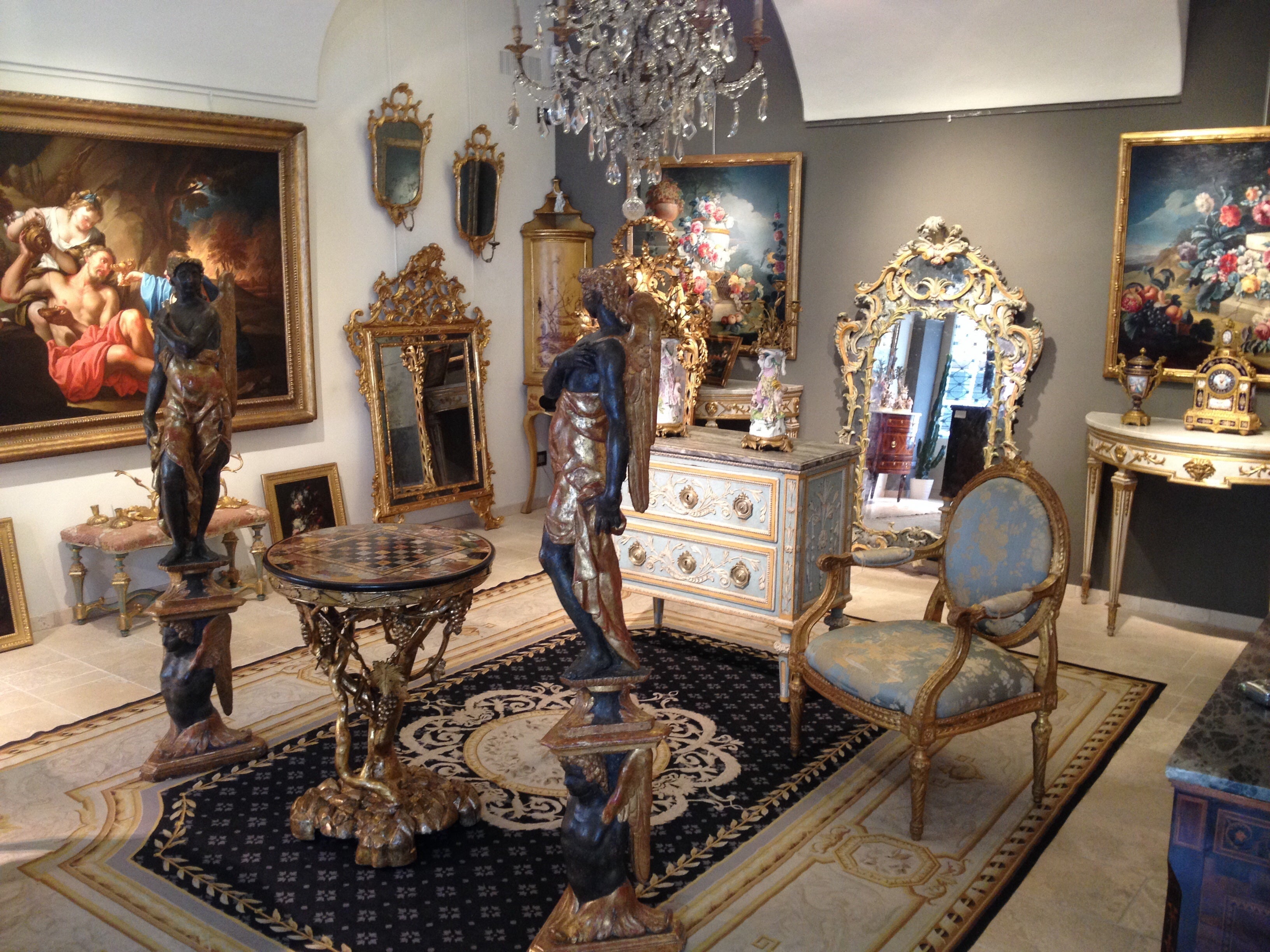
About the Seller
5.0
Platinum Seller
Premium sellers with a 4.7+ rating and 24-hour response times
Established in 1980
1stDibs seller since 2019
56 sales on 1stDibs
Typical response time: <1 hour
- ShippingRetrieving quote...Shipping from: Italy
- Return Policy
Authenticity Guarantee
In the unlikely event there’s an issue with an item’s authenticity, contact us within 1 year for a full refund. DetailsMoney-Back Guarantee
If your item is not as described, is damaged in transit, or does not arrive, contact us within 7 days for a full refund. Details24-Hour Cancellation
You have a 24-hour grace period in which to reconsider your purchase, with no questions asked.Vetted Professional Sellers
Our world-class sellers must adhere to strict standards for service and quality, maintaining the integrity of our listings.Price-Match Guarantee
If you find that a seller listed the same item for a lower price elsewhere, we’ll match it.Trusted Global Delivery
Our best-in-class carrier network provides specialized shipping options worldwide, including custom delivery.More From This Seller
View AllFrans Franken III 16th Century Oil on Wood, Adoration of the Magi, Painting
By Frans Franken the Younger
Located in IT
Frans Franken III and aid, Adoration of the Magi
Good condition
The oil painting on wood, with a gold background, depicts an Adoration of the Magi. The Magi are dressed in sumptuous silk and brocade dresses; they wear precious hats and jewelery. The richness of their garments is in contrast with the humility of the Holy Family and of the other characters who, around curious, observe the scene. The hut is simple, made of wood and straw: above it shines the Comet, symbol of the divine event. In the distance, a group of wayfarers walk along a path that is lost on the horizon, blending into the gold of the bottom.
The representation proposes a traditional iconography, in which the painter inserts some details that he lends himself to symbolic interpretations. Among these is the appearance of the Magi, who from the XIVth century differs iconographically: the wise astronomers represent the homage to Jesus of the then known parts of the world, namely Africa, Asia and Europe. To the right of the Magi, in the foreground, sits a monkey, considered a demonic creature and a symbol of lies and sin. It is depicted on the sidelines, as a defeat, next to a fragment of a classical column: ruin alludes to the end of paganism, of the old world that collapses with the advent of the new one, marked by the birth of Christ and liberation from the Original Sin. On the ruins he climbs the ivy, symbol of the immortality of the soul. The work is attributable to the workshop of the Flemish painter Frans Francken III...
Category
Antique 16th Century Belgian Renaissance Paintings
Materials
Paint
17th Century, The Martyrdom of the Four Crowned Saints by Giuliano Dinarelli
By Carlo Piacenza
Located in IT
17th century, The condemnation and martyrdom of the four crowned saints by Giuliano Dinarelli
Mid-17th century, Italy, Bologna
Oil on canvas, frame ...
Category
Antique Mid-17th Century Italian Baroque Paintings
Materials
Canvas
18th Century, Italian painting with Saint Nicholas and the miracle of the brick
Located in IT
18th Century, Italian painting with Saint Nicholas and the miracle of the brick
Oil on canvas; Frame cm H 136 x W 109 x D 10. Canvas cm H 100 x W 74
The oil on canvas painting, with...
Category
Antique 18th Century Italian Baroque Paintings
Materials
Canvas
18th Century, Italian painting Depicts Bambocciata by Giovanni Michele Graneri
Located in IT
Giovanni Michele Graneri (Italy, Turin 1708-1762)
Bambocciata (Farmers dancing in front of the inn)
The painting, made in oil on canvas, depicts a moment of celebration where some p...
Category
Antique Mid-18th Century Italian Baroque Paintings
Materials
Canvas
17th Century, Italian Painting by Pier Francesco Cittadini, Jacob and his Family
Located in IT
Pier Francesco Cittadini (Milan, 1616-Bologna, 1681)
"Jacob and his family go to Egypt"
Oil on canvas, cm 109 x 190 (canvas only)
The valuable painting, made in oil on canvas, depicts Jacob and his family go to Egypt and we believe it can be, given the high quality painting, autograph work of Italian Pier Francesco Cittadini (Italy Milan, 1616 - Bologna, 1681) made after 1647. The work, in excellent condition is accompanied by a coeval frame in wood finely carved and golden.
The scene depicted, which was confused with the Flight to Egypt in the past years, is instead identified with the biblical episode of Jacob’s journey. In the foreground, reading the painting from left to right, we see a caravan composed of animals, including donkeys, dromedaries, goats, dogs and horses and people, women, men and slaves, who carry on their journey along the banks of a river, following a path that to the right, would seem to lead to the through of a bridge. In addition to the watercourse is described an environment characterized by large rocks and impervious come far to cover the entire verticality of the canvas. On the left, in the distance, we see the tail of the caravan that runs along the steep path. Large trees enliven and harmonize the environment, as well as white and grey clouds characterize the predominantly clear sky and illuminated on the right by sunlight.
The story is told in the Bible, Book of Genesis, 30, 25, passage in which is described the flight of Jacob from Haran after the contrasts with Laban, father of his wife Rachel. Jacob is the third great patriarch of the Bible. From his descendants originate the twelve generations of the people of Israel. He is the son of Isaac and Rebekah, who led him to flee from the wrath of Esau to Haran to seek refuge from his brother, Laban. At his uncle’s house Jacob met his daughter Rachel. As soon as he saw his cousin, Jacob was taken. Jacob will stay seven years in the service of Laban to marry his beloved Rachel. But Laban, with a deception, will give him in marriage first Lia, the least beautiful eldest daughter, and only after another seven years the splendid Rachel. From his first wife he will have several children, while Rachel will give birth to the beloved son, Joseph, who will become viceroy of Egypt.
After years of service, Jacob asked to be paid with every dark-coloured garment among the sheep and every spotted and dotted garment among the goats. Laban accepted and sent away from his sons all the leaders of that kind. So Jacob took fresh branches of poplar, almond and plane tree, and flayed them, and put them in the troughs. The optical suggestion induced the goats and the sheep to conceive and give birth to dark, striped and dotted garments. He also ensured that all the strongest and healthiest leaders of the flock of Laban would drink near the barked branches, thus assuring a genetic superiority to his part of the flock. His flocks grew numerous and strong and he became richer than his relative, arousing envy. It was clear that Laban would not respect him much longer. At the suggestion of the Lord, Jacob decided to return to Canaan. Trying to avoid any possible dispute, he left with his family while Laban was absent for shearing sheep. But when, three days later, his uncle returned home, he became angry, feeling offended because Jacob had gone secretly and had not allowed him to greet his daughters and grandchildren. In addition, his teraphim, statuettes, or idols, which depicted the family deities, had disappeared. After 7 days of pursuit, Laban and his men reached Jacob’s group on Mount Gilead, in the mountainous region west of the Euphrates River, where his uncle and grandson had a stormy conversation. The younger man was outraged at being accused of stealing idols and told Labano to rummage through his family’s tents at will. Neither of them could know or even imagine that it was Rachel who took the idols and hid them in the saddle of the camel. During the search, she sat down firmly on the saddle, apologizing for not being able to get up, «because I usually have what happens to women» (Gen 31:35). So the loot wasn’t discovered.
The author of this work was inspired by the composition of an engraving by Stefano Della Bella (1610-1664) of circa 1647. The engraving by Stefano della Bella bears the title "Iacob sur ses vieux jours quitte sans fascherie pour voir son filz Ioseph, sa terre et sa patrie" and is signed on the bottom left "Stef. of the Beautiful In. et fe." while on the right it is declared "Cum privil. Regis", that is with license of the king.
Stefano Della Bella (Italy - Florence, May 18, 1610-Florence, July 12, 1664) was born in a family of painters, sculptors and goldsmiths and was left early orphan of his father sculptor, he dedicated himself first to the art of goldsmith at the school of Giovanni Benedetto Castiglione and Gasparo Mola, then turning his attention to drawing and engraving. He soon began drawing figures and copying the etchings of Jacques Callot, which inspired his early works. Under the protection of the Medici, in particular of Don Lorenzo, cadet son of Grand Duke Ferdinand I, Della Bella has the opportunity to make study trips to Rome, where he stayed from 1633-1636; In Rome he met French engravers and publishers of prints such as Israël Henriet and François Langlois, who influenced his decision to move to Paris in 1639, four years after the death of Callot. In Paris he soon reached, thanks to the engravings commissioned by Cardinal Richelieu, the success also worldly; he frequented courtiers, theatre artists and writers, while refusing too oppressive honors. In 1646-1647 he continued his travels in the Netherlands to Amsterdam, Antwerp and Dordrecht. He returned to Florence in 1650 and resumed working under the protection of the Medici court, working for his patrons. In 1656 he became a member of the Academy of Apatists.
The painting object of this study is reasonably attributable to Pier Francesco Cittadini, or Pierfrancesco Cittadini, called the Milanese or the Franceschino (Italy - Milan, 1616-Bologna, 1681) as some exemplary stylistic comparisons proposed to follow can prove.
Pier Francesco Cittadini was an Italian baroque painter, mainly active in Bologna.
His artistic training first took place with the painter Daniele Crespi...
Category
Antique Mid-17th Century European Baroque Paintings
Materials
Canvas, Giltwood
17th Century, Italian painting Allegory of the Spring Follower of Jacopo Bassano
By Jacopo Bassano
Located in IT
Follower of Jacopo Da Ponte, called Jacopo Bassano (Bassano del Grappa, circa 1510 - Bassano del Grappa, 13 February 1592), 17th century
Allegory of the Spring
Measures: With frame: ...
Category
Antique Late 17th Century Italian Baroque Paintings
Materials
Canvas
You May Also Like
Dutch 17th Century Oil on Wood Painting in the Manner of Frans Francken
Located in West Palm Beach, FL
A sensational Dutch 17th century Oil on Wood painting in the manner of Frans Francken. The painting depicts the scene of a feast with a young male and female enjoying a feast while musicians are playing music in the background. To the left of the table that are spectators who are turning their heads away from two guards killing a traitor seated at the table. In the background you have architectural buildings and additional figures. At the bottom center is a pet monkey...
Category
Antique 17th Century Dutch Paintings
Materials
Canvas, Giltwood
Oil on panel, Flemish School, 17th century
Located in Madrid, ES
Antique decorative oil painting on wood panel, belonging to the 17th-century Flemish school. The work depicts the biblical scene of "Susan and the Elders," a recurring theme in Baroq...
Category
Antique 17th Century Dutch Baroque Paintings
Materials
Wood
17th Century Oil on Canvas Italian Antique Religious Painting The Tribute Money
Located in Vicoforte, Piedmont
Antique religious painting from the second half of the 17th century. Oil on canvas artwork, first canvas, depicting the Tribute Money. In fact, there was a tax for the maintenance of...
Category
Antique 1680s Italian Paintings
Materials
Canvas
$6,666 Sale Price
20% Off
Free Shipping
Dipinto Fiammingo su Rame 1650 circa Scena di Genere con Commedia delle Arti
Located in Milano, MI
Dipinto Fiammingo del 1600 a olio su rame raffigurante uno scorcio di paesaggio con figure, una scena di genere con una moltitudine di personaggi affollati in una strada con delle ar...
Category
Antique Mid-17th Century Baroque Paintings
Materials
Copper
17th Century Oil on Canvas Flemish Mythological Antique Painting, 1660
Located in Vicoforte, Piedmont
A splendid 17th century Flemish painting. Oil on canvas artwork depicting a mythological subject of great charm, Meleager offers the boar's head to Atalanta. The Fates had predicted ...
Category
Antique 1660s Dutch Paintings
Materials
Canvas
$8,571 Sale Price
20% Off
Free Shipping
17th Century Oil on Canvas Flemish Interior Scene Painting, 1660
Located in Vicoforte, Piedmont
Antique Flemish painting from the 17th century. Oil on canvas artwork depicting a tavern interior scene with characters of excellent pictorial quality. Refined painting, for antique ...
Category
Antique 1660s Dutch Paintings
Materials
Canvas
More Ways To Browse
Hand Painted Soldiers
Blue John Table
Antique Teller
Wood Corpus Of Christ
Antique Fortune Teller
King Ludwig Ii
Scott Kerr
Used Furniture Croydon
Used Furniture Reading Pa
Verre Eglomise Painting
Wagner Plaque
Women Naked Painting
After Murillo
American Federal Portrait
Antique Furniture Islington
Boy Hoop
Gordon Roberts
Highland House Furniture
